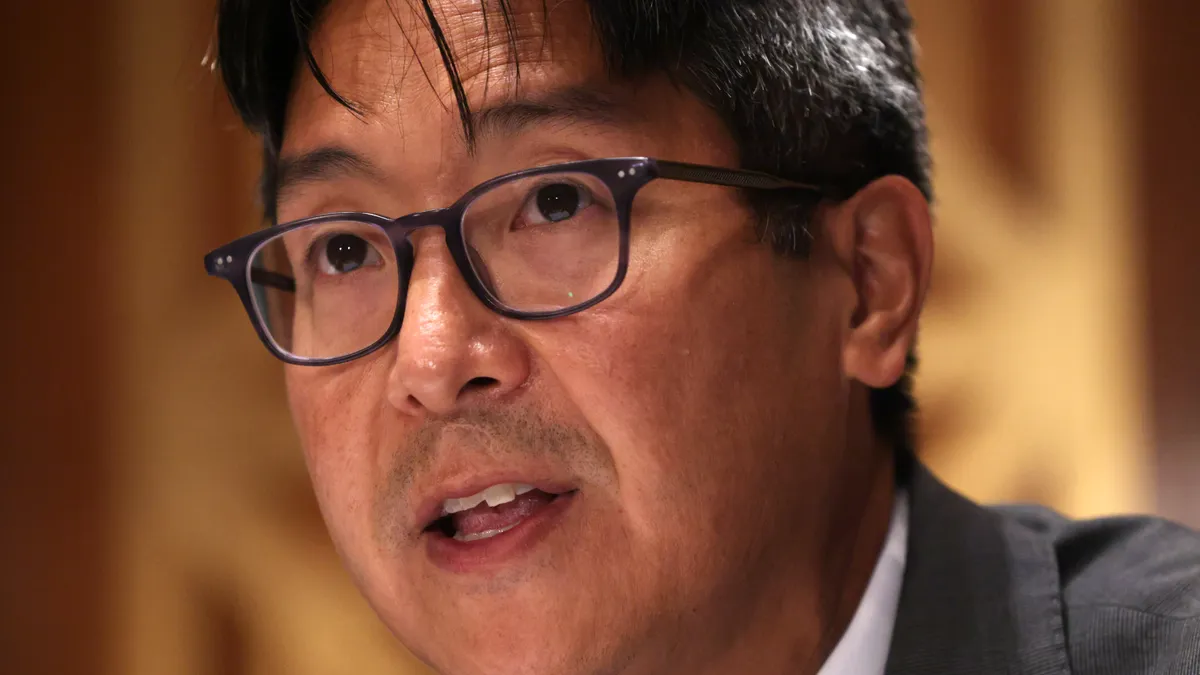LAS VEGAS — As more parties play a role in delivering financial products to consumers, the Office of the Comptroller of the Currency is grappling with how to tailor its oversight to cover a new “supply chain” of financial services.
“It's something we're going have to really grapple with, because I think the trend in banking, especially on payments, is more and more of this chopping up, if you will, of the different activities,” Acting Comptroller of the Currency Michael Hsu told Banking Dive during an interview at the Money20/20 conference Monday. “Essentially, they're going to be supply chains. And I think we need to start thinking about it like a supply chain.”
Banks are increasingly outsourcing tasks to fintechs and other vendors to deliver certain products and services to customers.
Bank regulators, including the OCC, have stepped up their scrutiny of third-party risk in recent months, issuing joint guidance in June that details how firms should monitor relationships with fintechs and other third parties.
But those relationships can create a dynamic where banks may work indirectly with a fourth- or fifth-party firm, as fintechs and vendors outsource their own services.
These additional layers are adding more complexity and risk to the financial services supply chain, Hsu said.
“We can do a lot through third-party [guidance], because that can ensure a lot of high standards, because a lot of those will flow through,” Hsu said. “But it may or may not be sufficient, depending on how things evolve. And we want to make sure we're ahead of that. So I think having a little bit more of a supply chain mindset may be helpful.”
Banking-as-a-service relationships, often arrangements where a financial institution provides the underlying banking services to a fintech or neobank, are more straightforward, Hsu said. Arrangements that involve multiple fintech partnerships are more complicated, and will likely garner more scrutiny from the OCC, he added.
“Sometimes you have a BaaS middleware player, different fintechs or your bank sponsor trying to do things at scale with lots of different kinds of players. That just, inherently, is more complicated. And if it's more complicated, there's likely going to be just a bit more risk there. And where there's a bit more risk, we're going to apply more scrutiny,” he said.
One of the challenges associated with monitoring BaaS in general is the space’s rapid growth and constant evolution, Hsu said.
“That does make it a little bit different than some of the other areas that we are traditionally examining for,” he said.
To keep pace, the OCC recently expanded and rebranded its Office of Innovation to the Office of Financial Technology, part of its recognition that “this is not innovation anymore,” Hsu said.
“This is just part of the landscape,” he said. “Part of that is to keep up with the growth and complexity. I feel like we do have a pretty good overall sense of what's going on, but as we've talked about, it's complex, it's constantly changing. So just trying to stay on top of it does require a ton of energy.”














